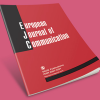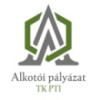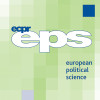Mid-term strategic plan of the Institute for Political Science (summary)
Leading the way in domestic political science: the Institute for Political Science has achieved outstanding publication performance in international journals between 2019 and 2022
Latest news
.jpg&w=100&h=100&zc=1)
Veronika Patkós' new article titled "Measuring partisan polarization with partisan differences in satisfaction with the government: the introduction of a new comparative approach" is now available in the Quality & Quantity journal.

A new article has been published in the Political Communication journal, entitled "Keep Them Engaged! Investigating the Effects of Self-centered Social Media Communication Style on User Engagement in 12 European Countries". It has been written by Márton Bene, Andrea Ceron, Vicente Fenoll, Jörg Haßler, Simon Kruschinski, Anders Olof Larsson, Melanie Magin, Katharina Schlosser and Anna-Katharina Wurst

A new article entitled "Strikingly similar: Comparing visual political communication of populist and non-populist parties across 28 countries" is now available in the European Journal of Communication. It was authored by Xénia Farkas, Daniel Jackson, Paweł Baranowski, Márton Bene, Uta Russmann, and Anastasia Veneti.

The Institute for Political Science, Centre for Social Sciences is launching a scholarship programme for BA, MA and PhD students to support scientific work in political science. The programme offers a short-term publication scholarship to increase the international visibility of the academic production of young scholars. To be eligible for a 2022 Scholarship, a candidate must be an undergraduate/graduate/doctoral student enrolled at a Hungarian University.

A new publication entitled "The Polyphonic Sounds of Europe: Users 'Engagement with Parties' European-focused Facebook posts" in the journal Politics & Governance.

Husz, Ildikó, Kopasz, Marianna and Medgyesi, Márton's new article entitled "Social Workers’ Causal Attributions for Poverty: Does the Level of Spatial Concentration of Disadvantages Matter?" has been published in Social Indicators Research.

Jordá, Beatriz, Cañedo, Azahara, Bene, Márton & Goyanes, Manuel’s new article entitled "Out-of-Place Content: How Repetitive, Offensive, and Opinion-Challenging Social Media Posts Shape Users’ Unfriending Strategies in Spain" has been published in Social Sciences.
.jpg&w=100&h=100&zc=1)
New publication of Zsófia Papp, "The Indirect Effect of Electoral Rules on Citizens' Satisfaction with Democracy: A Comparative Study" was published in the Swiss Political Science Review.
.jpg&w=100&h=100&zc=1)
New publication of Balázs Böcskei and Eszter Farkas has been published on the “The Loop” website. "The Loop" is the official blog of the ECPR (European Consortium for Political Research).
Latest posts

In the fifth pti memo blog post, we report on a lecture by Boglárka Koller, in which she presented her project titled "Cultivating Our European Resilience and Evolution" (CORE) and its significance. Boglárka Koller is the Head of the Department of European Studies at the University of Public Service, Senior Research Fellow at the Centre for Economic and Regional Studies (KRTK), and Jean Monnet Chair. The lecture was hosted by the HUN-REN CSS Institute for Political Science on May 22, 2025, as part of its Speaker Series.

The latest post of the pti memo blog series offers insights from a thought-provoking lecture by Murat Somer, Professor of Political Science and International Relations at Özyeğin University Istanbul and Research Affiliate at the Democracy Institute of the Central European University. Titled "Quo Vadis in Turkey and Implications for Democracy in the World", the lecture explored current political developments in Turkey and their broader implications on combating democratic backsliding. The event took place on May 8, 2025, as part of the HUN-REN CSS Institute for Political Science’s Speaker Series.

The third blog post of the pti memo series summarises the lecture of Dr. Matthew Edward Bergman, Assistant Professor at Corvinus University of Budapest, titled “Ideological Conflict, Logrolling, and Policy Reform: An Analysis of Government Declarations in Western Europe.” The event was organised as part of the HUN-REN Institute for Political Science’s Speaker Series on April 10, 2025. This research, conducted jointly with Hanna Bäck (Lund University) and Wolfgang C. Müller (Universität Wien), investigates why some governments commit to more reform measures in their government declarations.

The second pti memo post summarises the lecture by Bálint Magyar and Bálint Madlovics, researchers at the CEU Democracy Institute, titled “The Russia-Ukraine War and Its Structural Consequences.” The event was organised as part of the HUN-REN Institute for Political Science’s Speaker Series on February 6, 2025.
Hungary is often portrayed as a problem case for European integration due to frequent clashes between Viktor Orbán’s government and the EU’s institutions. Yet, as András Bíró-Nagy and Gergő Medve-Bálint explain in their post on the LSE EUROPP blog, the country’s 20 years in the EU have also seen a relatively high level of compliance with EU policies and strong support for membership among the public.
.png&w=100&h=100&zc=1)
In the first pti memo post, we summarise Christian Baden’s (Hebrew University of Jerusalem) thought-provoking lecture titled “Propaganda as a Social Process.” The lecture was hosted by the HUN-REN Institute for Political Science as part of its Speaker Series event series on January 23, 2025.
.jpg&w=100&h=100&zc=1)














.jpg&w=100&h=100&zc=1)
.jpg&w=100&h=100&zc=1)




.png&w=100&h=100&zc=1)